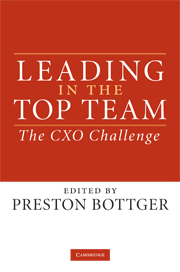Book contents
- Frontmatter
- Contents
- Figures
- Tables
- Contributors
- Editor's Acknowledgments
- 1 Introduction – Leading within and across the functions
- Section I The Business Imperatives
- 2 The Leadership Imperative – Driving wealth creation
- 3 The Talent Imperative – All CXOs must strengthen the company's talent pool
- 4 The Learning Imperative – Going offline to improve performance
- Section II The CXOs: Within the Functions
- Section III The CEO and the Leadership Team – Pulling it all together
- Conclusion
- Index
- References
2 - The Leadership Imperative – Driving wealth creation
Published online by Cambridge University Press: 19 August 2009
- Frontmatter
- Contents
- Figures
- Tables
- Contributors
- Editor's Acknowledgments
- 1 Introduction – Leading within and across the functions
- Section I The Business Imperatives
- 2 The Leadership Imperative – Driving wealth creation
- 3 The Talent Imperative – All CXOs must strengthen the company's talent pool
- 4 The Learning Imperative – Going offline to improve performance
- Section II The CXOs: Within the Functions
- Section III The CEO and the Leadership Team – Pulling it all together
- Conclusion
- Index
- References
Summary
It's my job to consider the long term. Most people in most jobs in the company don't think like that. They think about the day-to-day things – that's as it should be – so it's not at all obvious to them why the changes I think have to be made, have to be made.
(CEO, global airline)I sometimes see in leadership books and in reviews of these books a statement along the lines of: ‘After decades of study, the phenomena of leadership are still not well understood.’ This is a mistaken view.
Actually, a great deal is understood about leadership, and has been for a very long time. While it is certainly true that leadership is a vast and multi-faceted topic that finds different expressions in different situations, and can therefore be described and interpreted in many different ways, we can still make valid and fertile statements about ‘what is leadership’, even if there will never be a single-paragraph definition that will satisfy everyone.
The view of leadership that follows in this chapter is the author's personal statement. It will not be to all tastes. It distils twenty-five years of observation, engagement and scholarship, working closely with executives and listening to their views, as well as researching leadership across business, politics, the military, the arts, entertainment and sport.
Leadership and strategy are closely intertwined, in concept and practice. Both convey the related elements of desirable goals, the methods for pursuing them, and results actually achieved.
- Type
- Chapter
- Information
- Leading in the Top TeamThe CXO Challenge, pp. 11 - 32Publisher: Cambridge University PressPrint publication year: 2008



